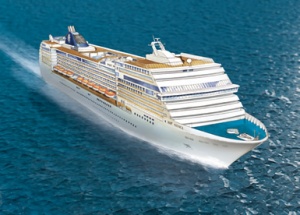Costa Cruises reveals its 7th sustainability report

Costa Cruises, Europe’s number one cruise line, has announced excellent environmental results in the seventh edition of its Sustainability Report. The full report is available online at www.costacruise.com/best4.
The report was revealed at the Seatrade Med 2012 in Marseilles, the biggest event of the year for cruise operators in the Mediterranean. Key achievements include a 50% reduction in greenhouse gas emissions, a 3.8% decrease in fuel consumption and a 40% increase in hours spent on training.
These results demonstrate that Costa Cruises not only operates in accordance with the established environmental compliance laws, but continuously strives to achieve wider objectives. Through a dedicated management and control system that goes beyond the scope of mandatory requirements set out by local, national and international regulations, Costa Cruises actually anticipates possible solutions for improving environmental standards.
The main results obtained in 2011 are as follows:
* A 3.8% reduction in greenhouse gas emissions compared to the previous year due to reduced fuel consumption, representing a 14.5% decrease since 2007. These emissions are measured in terms of ‘specific’ emissions and consider factors such as the total nautical miles sailed during the year and the available lower berth days across the fleet. Various measures directed at reducing energy consumption were implemented to achieve this reduction, such as the use of ecological silicone-based coatings for the ship’s hull, the use of low power consumption LED light bulbs and energy-efficient HVAC (heating, ventilating and air conditioning) technology as well as the use of inverters to optimise the performance of fans and blowers in the engine room
* A 50% decrease in emissions of ozone-depleting substances thanks to the replacement of refrigerating and conditioning systems and the gradual conversion of plants containing HCFCs (hydrochlorofluorocarbons) into systems using HFCs (hydrofluorocarbons), which have an ODP (Ozone Depletion Potential) of zero
ADVERTISEMENT
* 71% of the water used on the ships in the Costa fleet is produced directly on board using desalination plants and evaporators
* 2011 saw the launch of the ‘Sustainable cruise’ project co-funded by the European Commission through the ‘Life+’ Programme, the EU’s funding instrument for innovative environmental projects. Costa Cruises is Project Manager of this ‘Sustainable cruise’ project, the world’s first ever shipboard experimental project involving the use of innovative techniques and methods to deal with three specific types of waste – packaging, biodegradable (organic) waste and paper – with precise objectives regarding reduction at the source and recycling. Costa Pacifica (114,500 gross tonnage and 3,780 total guests) was chosen to pilot this project and the initial activities began earlier this year. The ‘Sustainable Cruise’ project dovetails with Costa Cruises’ own waste management policy of 100% separation of solid waste on board, which has been applied fleet-wide for some time now.
Costa Cruises’ ongoing commitment to sustainability is demonstrated by the prestigious environmental awards that stakeholders granted to the company once again in 2011, including eight new international awards certifying Costa Cruises’ vocation for innovation and compliance with the highest environmental protections standards.
Internal training was also a priority in 2011, in terms of both on-board and shore-side employees. Training hours totaled around 780,000, an increase of some 40% compared to the previous year, with tuition covering social accountability, environment and safety, as well as managerial, technical and language refresher courses. Finally, Costa Cruises’ community support recycling projects continued in Brazil, where various types of waste are recycled with the aim of financing local social development. In 2011 funds were used to support ‘CAPDEVER’ association in Salvador de Bahia, which aids families living in extreme poverty, and to support ‘Crianca Feliz’ NGO in Santos which organises sport courses for children in need.

